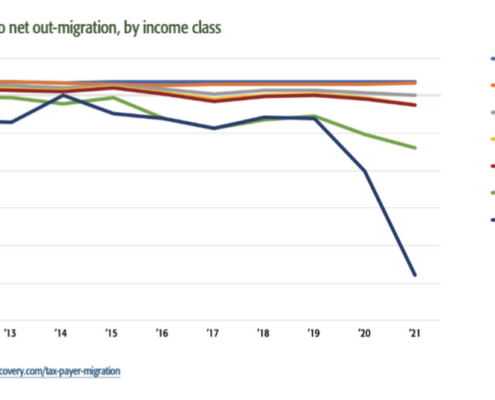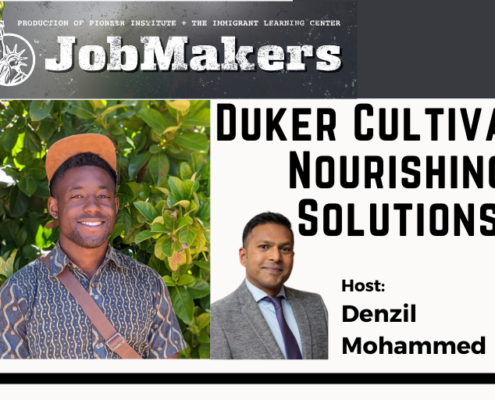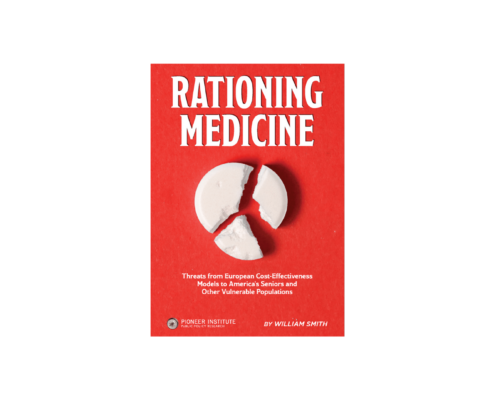
Senate Tax Package Misses the Mark on Competitiveness
The Senate tax package, S.2397, is heavy on provisions that reduce the tax burden for certain taxpayers, thereby helping those that qualify for the expanded credits and deductions. The bill, however, is light on provisions that will improve the Commonwealth’s competitiveness.

Study: Immigrant Entrepreneurs Benefit N.E. Economy, Despite Facing Obstacles to Growth
BOSTON – Immigrants in Massachusetts and New England are more likely to be self-employed, but the businesses they own tend to be in different industries than those owned by the U.S. born, according to a new study published by Pioneer Institute.

The MassLottery: A Bay Stater’s Favorite Pastime
The Massachusetts lottery made $5.9 billion in 2021, making it the fourth-highest source of revenue for the state. This confirms a long-standing trend: that Massachusettans love to play the lottery.

Dodging Debt Default: Who Won Congressional Cage Match Compromise
Joe Selvaggi talks with CATO Institute budget expert Chris Edwards about the details of the newly passed Fiscal Responsibility Act, which avoids crossing the debt ceiling in exchange for slowing spending growth.

Tilting Offshore Windmills: Speaking Truth to Ratepayers
Joe Selvaggi talks with energy economist Dr. Jonathan Lesser about the chasm between the promises and realities of offshore wind projects, including the likely increased costs passed to electricity consumers and taxpayers.

Picking Patients’ Pockets: Exposing Insurance Schemes Targeting Orphan Diseases
Joe Selvaggi talks with Pioneer Institute’s senior Health Care Fellows Dr. Bill Smith and Dr. Robert Popovian about their white paper "Out-of-Pocket Pirates: Pharmacy Benefit Managers (PBMs) and the Confiscation of Out-of-Pocket Assistance Programs." This episode explores what consumers and regulators can do to ensure those with rare diseases are not left without assistance.

Erec Smith on the Rhetoric of Anti-racist Activism
Joe Selvaggi talks with York College of Pennsylvania Associate Professor Eric Smith about the disempowering effects of modern anti-racism movement and the challenges for thought leaders who espouse more constructive narratives.

Opinion: Drug patents aren’t a ‘necessary evil.’ They save lives.
Drug patents are one of the most important public policy innovations in all of human history, and a boon to patients awaiting cures. Inventions only come when inventors are rewarded, not punished. Patents are not a “necessary evil.”

Study: Net Out-Migration of Wealth from Massachusetts Nearly Quintupled from 2012-2021
IRS data reveals that net out-migration from Massachusetts is accelerating rapidly and is greatest among affluent residents who pay the most in state taxes, according to a Pioneer Institute analysis. Between 2019 and 2021, Massachusetts rose from ninth to fourth among all states in net out-migration of wealth, behind only California, New York, and Illinois.

Study: High List Prices and Deep Discounts for Prescription Drugs Hurt Poor and Sick Patients
A new Pioneer Institute study illustrates how the current system of drug pricing and discounts leads to patients with challenging diseases being charged huge out-of-pocket sums to keep other premiums low, effectively imposing financial penalties on the sick to protect the healthy and wealthy.

Massachusetts’ Misguided Middle-Class Health Insurance Subsidy Expansion
A proposal on Beacon Hill to expand insurance subsidies up to 500 percent of the federal poverty level, could push the small business insurance market into a death spiral, without reducing the number of uninsured and hurting those with preexisting conditions.

Bank of Big Brother: Exploring a National Digital Currency Future
Joe Selvaggi talks with financial privacy and digital currency expert Nicholas Anthony of CATO Institute Center for Monetary and Financial Alternatives about the potential benefits and risks were the U.S. to adopt a national digital currency.

Transparency, Please! MBTA Resists Disclosure of Arbitration Award
Joe Selvaggi talks with attorney for Pioneer Public Interest Law Center (PPILC) John La Liberte, about the work he did to successfully gain access to the MBTA retirement fund’s arbitration agreement after a seven-month legal struggle.

New IRS Data Shows Out-Migration Worsening, Underscoring the Need for Massachusetts Leaders to Focus on State’s Competitiveness
Massachusetts’ net loss of adjusted gross income (AGI) to other states grew from $2.5 billion in 2020 to $4.3 billion in 2021, according to recently released IRS data. Over 67 percent of the loss was to Florida and New Hampshire, both states with no income tax.

Poll Finds Charter Schools Widely and Broadly Popular in Massachusetts
More than six years after the failure of a statewide ballot initiative that would have increased the number of charter public schools in Massachusetts, a poll shows that 62 percent either strongly or somewhat favor them, with only 16 percent opposed.

Duker Cultivates Nourishing Solutions
Denzil interviews Chening Duker, founder of GoodPluck, a farm-to-table delivery service that is transforming the lives of Michiganders and is enriched by Duker's personal heritage and global perspective on organic agriculture.

PioneerLegal Gains Access to MBTA Pension Arbitration Award After Seven-Month Process
After a more than seven-month struggle, PioneerLegal—now known as Pioneer Public Interest Law Center—has gained access to an important August 2022 arbitrator’s decision about a dispute between the MBTA and its largest union, the Carmen, over the severely underfunded MBTA Retirement Fund (MBTARF).

Study Finds COVID Led to Significant Declines in Massachusetts School Enrollments
After a decade of relative stability, COVID has wreaked havoc with Massachusetts public school enrollments, and the U.S. Department of Education projects more declines by 2030, according to a new study published by Pioneer Institute. The figures should serve as a warning to vulnerable districts that they must be prepared for the financial, staffing, and facilities impacts that may accompany substantial drops in public school enrollments.

Public Statement on the House’s Proposed Tax Reform and Budget
Pioneer Institute applauds key tax reform provisions advanced by the Speaker and House leadership, including a reduced short-term capital gains tax rate and implementation of a single sales factor apportionment. But leadership must do more to bolster the state’s economic competitiveness and slow out-migration of wealth and business owners that endangers the commonwealth’s economic future.

Out-of-Pocket Pirates: Spotlight on Accumulator & Maximizer Programs
A new white paper, "Out-of-Pocket Pirates: Pharmacy Benefit Managers (PBMs) and the Confiscation of Copayment Assistance Programs," examines how the way these programs are implemented is having negative impacts on patients living with serious diseases.

Rationing Vital Therapies: Should Healthcare Experts Decide Who Lives?
Joe Selvaggi talks with senior health care fellow Dr. William Smith about his new book Rationing Medicine: Threats From European Cost Effectiveness Models to Seniors and Other Vulnerable Populations, and the book’s cautionary warning against embracing European standards for valuing life saving therapies.

New Book Highlights the Negative Impacts of Controversial QALY Value Assessment Framework on Patient Access & Affordability
Pioneer Institute has released a new compilation of research regarding the impact of the Quality Adjusted Life Year (QALY) methodology on the ability of patients, including some of the most vulnerable patient communities, to access treatments. The Pioneer book, Rationing Medicine: Threats from European Cost-Effectiveness Models to America's Seniors and other Vulnerable Populations, is authored by Dr. Bill Smith, Senior Fellow and Director of the Life Sciences Initiative at Pioneer Institute, and compiles research and data about the discriminatory nature of the QALY for aging adults, those living with disabilities or rare diseases, and more.

Debunking Tax Migration Myths
Provisions of Gov. Healey’s $876 million tax package targeted to higher-income earners — including revisions to the estate tax and a reduction in the tax rate for short-term capital gains — are important for encouraging taxpayers subject to them to remain in Massachusetts, according to a new analysis from Pioneer Institute.

Study: Massachusetts Should Join 45 States and Allow Prescribers to Dispense Medications
A Pioneer Institute study shows that middlemen—commercial pharmacies and pharmacy benefit managers—add substantial costs over wholesale prices. Allowing prescribers to dispense routine drugs would save consumers money without compromising safety.

A Federal Drug Discount Program for the Wealthy
The combination of legal disputes, a growing data repository and investigative reports have necessarily put the 340B Drug Pricing Program under the microscope. Combined with the fact that the policy lacks transparency, 340B has spiraled out of control to the point that no policymaker can ignore the need to look closer.

Silicon Valley Bust: Bank Failure’s Causes, Cures, and Culpability
Joe Selvaggi talks with financial market and monetary policy expert Dr. Norbert J. Michel about the causes for the failure of Silicon Valley Bank and the what its demise portends for depositors, the banking sector, and the regulatory regime that governs it.

Bay State Budget Breakdown: New Administration Offers Something for Everyone
Joe Selvaggi talks with Pioneer Institute's Senior Fellow in Economic Opportunity Eileen McAnneny about the contours of Governor Healey’s $55.5 billion budget and tax relief plan, and whether they serve to make Massachusetts more livable and economically competitive.

Sunshine Week 2023: Shining Light on the Workings of Government
Pioneer Institute is proud to join with the media and others—including The Boston Herald, The Boston Globe, CommonWealth Magazine, Common Cause, and the ACLU—in marking Sunshine Week, March 12-18.

Lauren Redniss on Marie Curie, STEM, & Women’s History
0 Comments
/
This week on The Learning Curve, Cara and Gerard mark Women's History Month with Lauren Redniss, author of Radioactive: Marie & Pierre Curie: A Tale of Love and Fallout, the first work of visual nonfiction to be named a finalist for the National Book Award.

Gov. Healey’s Tax Plan: Not Enough on Competitiveness
In an effort to deliver "an affordable, equitable and competitive tax structure for Massachusetts," Governor Maura Healey on Feb. 28 unveiled her tax package. While her proposal makes significant strides in addressing affordability and indirectly improves equity, it does little to address the issues of competitiveness.
